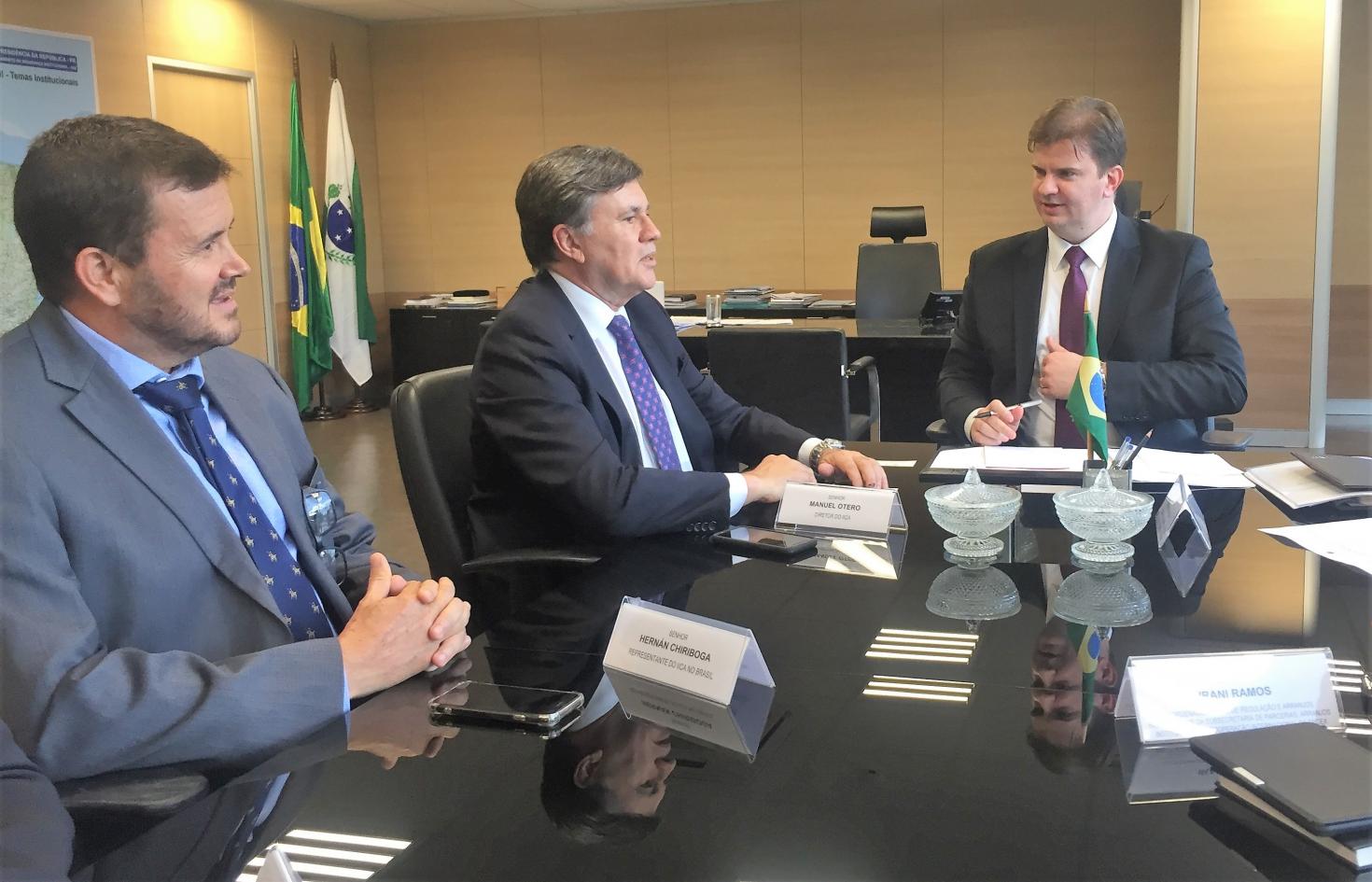IICA promotes new programs and broadens partnerships in Brazil

Brasilia, 26 February 2019 (IICA). The Director General of the Inter-American Institute for Cooperation on Agriculture (IICA), Manuel Otero, met in Brasilia with high-level authorities of Brazil’s new government, with whom he discussed the implementation of new, innovative projects in the country, while highlighting the technical capabilities of the agency specializing in agricultural and rural development.
As part of an extensive work agenda in the Brazilian capital, Otero met with the Minister of Regional Development, Gustavo Canuto, to discuss ways to expand IICA’s cooperation in matters related to the safety of state-owned dams, which is presently a sensitive topic on Brazil’s agenda.
The Ministry of Regional Development and IICA recently launched a Strategic Action Plan for the Rehabilitation of Dams in the Union (Planerb), which was developed based on studies conducted over a two-year period, during which 35,000 kilometers were crossed in order to evaluate 139 dams in 14 states in Brazil, yielding valuable results.
“Planerb was launched at a very important time, providing a precise assessment, particularly regarding the changes required in the risk classification for dams. We must achieve greater progress in this area, particularly in matters related to training. The partnership with IICA will prove very helpful in this regard,” stated minister Canuto.
Otero also met with the Minister of Citizenship, Osmar Terra, with whom he discussed IICA’s participation in programs aimed at improving nutrition among rural children as well as other projects related to food security.
The Director General of IICA also spoke with Marcos Montes, Executive Secretary (Deputy Minister) of the Ministry of Agriculture, Livestock and Supply (MAPA).
IICA is engaged in six technical cooperation projects with MAPA, which are related to a number of topics such as the defense of agriculture, the strengthening and competitiveness of agribusinesses and incentives for family farming. Ambassador Orlando Leite Ribeiro, Secretary of International Relations of MAPA, also welcomed Otero to Brazil.
“The purpose of the visit was to get to know the new managers of MAPA and to underscore IICA’s intention to perfect projects that are currently underway, as well as to establish new agreements in other areas, such as fisheries and meteorology,” noted Otero.
MAPA is currently implementing six technical and international cooperation projects with IICA.

“Together with the Ministry, we are implementing projects in matters related to cooperative undertakings, the defense of agriculture and modernization, which are progressing quite well. Moreover, we would like to discuss new opportunities and joint challenges. Our goal is to make the best possible contribution, continuously aiming to improve Brazil’s agricultural and rural development,” added Otero.
One of the proposals under discussion is the strengthening of health services in Brazil’s neighboring countries in order to prevent different problems, such as the carambola fruit fly.
Marcos Montes highlighted IICA’s historical importance and noted that MAPA will seek to broaden its partnership with the Institute.
“IICA is recognized as an institute that provides a doubly important social service and has strong linkages with the Ministry of Agriculture, which we hope to preserve, evidently within the framework of the philosophy that Tereza Cristina, the minister (of Agriculture), is implementing here,” remarked Montes.
Otero also participated in a meeting with Márcio Lopes da Silva, Chair of the OCB System (Organization of Brazilian Cooperatives), with whom he signed a memorandum of understanding that will facilitate actions aimed at supporting agricultural production, food security and the socioeconomic development of rural producers.
Venezuela’s serious political, economic and social situation was also on the agenda of Otero’s meetings in Brazil, during which IICA reiterated its commitment to decisively contribute to rebuilding the country’s agrifood chains, a pressing need and concern for the Venezuelan population.
“IICA is a technical rather than a political organization. However, it cannot remain indifferent to the troubling situation in Venezuela, where people are suffering due to the lack of food, and where virtually all food consumed is imported because producers were either expropriated or must overcome harsh conditions in order to produce, as reflected by production data that has shown a significant decline,” concluded Otero.
More information:
Carolina Fleury, IICA Communication Consultant in Brazil.